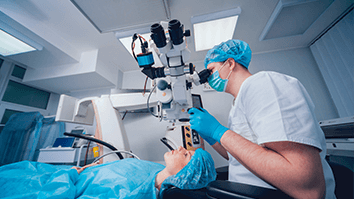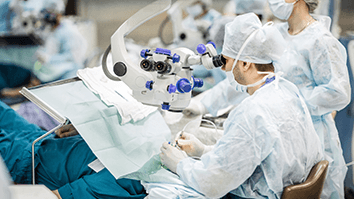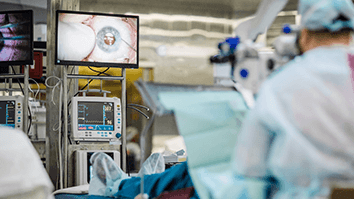30+
Centers
Do you experience blurry vision? Then you need to immediately consult an eye specialist for a check-up. Cataract (मोतियाबिंद) is the clouding of the natural eye lens which results in blurry and cloudy vision. Cataract generally affects elderly people but is sometimes known to occur in newborn babies. Cataract Surgery is the procedure in which cloudy lens is removed and replaced with artificial Intraocular lens (IOL). At EYE-Q, we have eye specialist doctors having more than a decade of experience in treating cataract (मोतिया) in patients of all age group. EYE-Q Hospitals has recently incorporated latest femtosecond lasers to perform cataract operation.

Poor Night Vision: Cataract develops gradually over time affecting eye Vision resulting in poor night vision. Over the time cataract get larger resulting in blurry vision or eye blindness which can affect people’s ability to perform daily tasks.

Blurry Vision: Blurry Vision is caused in case of severe clouding of the eye lens. Blurry and dull vision is the foremost symptom (लक्षण) of Cataract. If the cataract is still not treated, it could lead to blindness or permanent Vision loss.

Multiple Eye Vision: Multiple Eye Vision could occur due to improper scattering of light by Cloudy eye lens resulting in multiple incomplete images. The patient will see multiple blurry images which can lead to severe Vision defect.

Robotic Laser Assisted Cataract Surgery: Femtosecond lasers technology offers bladeless and painless Cataract surgery and operation. The process is fast and safe.

Micro-incision Cataract Surgery: A small corneal incision of 1.8-2.2mm is done for removing cataract and implantation of the lens. The procedure of surgery is stitchless and painless offering quick postoperative recovery.

Phacoemulsification: A small corneal incision of 2.8mm is done and cataract is removed by ultrasonic phacoemulsification probe and IOL is implanted. The operation process is stitchless and offers quick recovery.
Uttar Pradesh | Gujarat | Haryana | Uttarakhand | Nigeria
Centers
Specialists
Patients Treated
Now Cataract Surgery is not painful. Laser assisted Cataract surgery is bladeless, painless and provide assured result.
Choosing Eye-Q Super-Speciality hospital can be the best decision because our hospital is run & supervised by experienced eye surgeons. They are acquainted with high-end technologies and implement them to deliver the best outcomes. The application of progressive technologies makes surgery minimally invasive yet precise.




Earlier the better when it comes to cataract surgery as it avoids chances of complications caused due to maturing of Cataract. With advanced technology available with Eye-Q India, it is a safe operation throughout the year irrespective of season.
Cataract surgeries at Eye-Q India are done by experts using advanced technology. The surgery lasts for 5 to 15 minutes. Entire process from admission to discharge takes about 3-4 hours.
Cataract lenses are designed to last an entire lifetime if they are implanted timely under skilled hands and are done using advanced equipments. The intraocular lens is placed permanently in your eye and will not "wear out".
We have experts in our clinical team who can take care of it before or during surgery